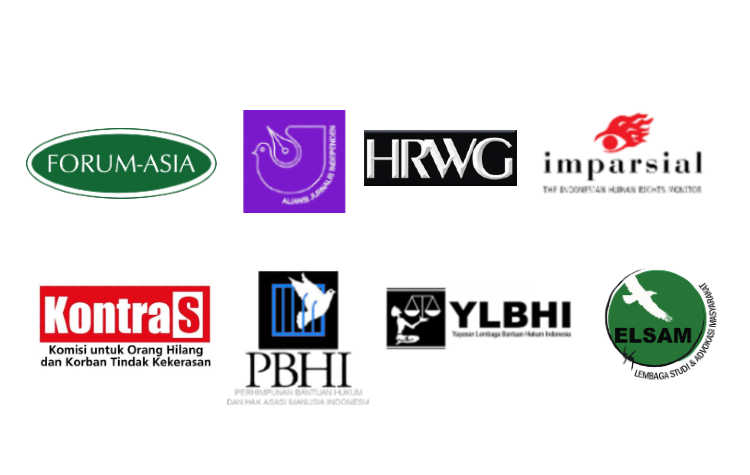
(Bangkok/Jakarta, 15 May 2020) – Indonesia’s newly adopted law on state financial policy, as part of its response to the COVID-19 pandemic, triggers further distrust of Indonesia’s commitment to anti-corruption and democracy, said rights groups.
This follows the passing of the Government Regulation in lieu of Law (Perppu) No. 1 of 2020 on State Financial Policy and Financial System Stability for the Handling of the COVID-19 Pandemic into law on 13 May.
In a joint statement today, the Asian Forum for Human Rights and Development (FORUM-ASIA) and seven of its Indonesian members expressed concern that the law undermines the country’s fight against corruption. The rights groups also criticised the lack of meaningful civic participation in Indonesia’s policy-making process, questioning the country’s commitment to democracy.
The members are: The Alliance of Independent Journalists Indonesia (AJI), the Commission for the Disappeared and Victims of Violence (KontraS), the Human Rights Working Group (HRWG), the Indonesian Human Rights Monitor (Imparsial), the Indonesian Legal Aid and Human Rights Association (PBHI), the Indonesian Legal Aid Foundation (YLBHI), and the Institute for Policy Research and Advocacy (ELSAM).
The Law on State Financial Policy and Financial System Stability for the Handling of the COVID-19 Pandemic was passed by an overwhelming majority in Parliament, despite pressure from civil society to drop the regulation due to concerns of corruption and impunity. The decision also nullified the ongoing judicial review in Indonesia’s Constitutional Court filed by several civil society organisations against the regulation.[1]
The rights groups flagged several problematic clauses in the law, including Article 1(3) and (4), which grant authorities overarching power to adjust state budget policies, including those related to tax and expenditure, on the pretext of responding to COVID-19 and threats to the economy. Under these provisions, the State is granted authority to reallocate funds from various sources, including the education endowment fund and other public services such as public hospitals, as stipulated in the Article 2 (1e) of the regulation. The vague nature of these clauses enables the authorities to undertake measures that may not even contribute to the COVID-19 response.
‘Instead of introducing effective measures to respond to the pandemic, the law will open possibilities for bigger budgets to be allocated for any measure that may not even have anything to do with COVID-19,’
said Asfinawati, Chairperson of (YLBHI). ‘It could be misused to provide tax relief for corporations at the expense of education and health sectors.’
‘Another problematic provision is in Article 27, which guarantees immunity to Government officials,’ said Yati Andiryani, Coordinator of KontraS. Article 27 shields officials responsible for fiscal and monetary policies from any legal action on the assumption that they would have acted in good faith.
‘Passing this law has proven that the Government has sidelined the principles of law enforcement and anti-corruption under the guise of addressing the COVID-19 crisis,’ she added.
Since the beginning of the pandemic, civil society in Indonesia has criticised lawmakers for continuously adopting laws that exacerbate the vulnerabilities of the people, particularly poor and marginalised communities, without open and transparent process.
In addition to the newly adopted law, the Parliament approved a controversial revision of the 2009 Coal and Mineral Mining Law[2] on 12 May 2020, which rights groups warn would have an adverse impact on the environment and indigenous communities. The controversial Omnibus Law, which rights groups fear will exacerbate vulnerabilities faced by the labour force, is also a pending agenda in the Parliament.
‘The decision taken by Indonesian lawmakers to pass controversial bills in the absence of meaningful civic participation, amidst movement restrictions during COVID-19, is alarming. The law will further undermine the principle of accountability and transparency in democracy, during and after the pandemic,’ said Shamini Darshni Kaliemuthu, Executive Director of FORUM-ASIA.
To date, Indonesia has recorded at least 16,006 COVID-19 cases and 1,043 deaths.[3] In this precarious situation, the Government of Indonesia should focus its efforts on addressing the needs of its people, particularly the marginalised and vulnerable.
The rights groups called on the Government of Indonesia to cease any attempt to adopt laws or measures that use COVID-19 as pretext for a breeding ground for corruption and undermine the country’s democracy.
About FORUM-ASIA:
- The Asian Forum for Human Rights and Development (FORUM-ASIA) is a regional network of 81 member organisations across 21 Asian countries, with consultative status with the United Nations Economic and Social Council, and consultative relationship with the ASEAN Intergovernmental Commission on Human Rights. Founded in 1991, FORUM-ASIA works to strengthen movements for human rights and sustainable development through research, advocacy, capacity-development and solidarity actions in Asia and beyond. It has sub-regional offices in Geneva, Jakarta, and Kathmandu. forum-asia.org
**
For a PDF version of this statement, please click here.
For further information, please contact:
East Asia and ASEAN Programme, FORUM-ASIA at [email protected]
For media inquiries, please contact:
Yi-Lan, Communication and Media Programme, FORUM-ASIA at [email protected]
[1] https://nasional.kontan.co.id/news/perppu-nomor-1-tahun-2020-digugat-ke-mk-begini-tanggapan-staf-khusus-menkeu
[2] https://www.thejakartapost.com/news/2020/05/12/house-approves-revised-mining-law-amid-outcry.html
[3] https://www.thejakartapost.com/news/2020/03/23/indonesias-latest-covid-19-figures.html




